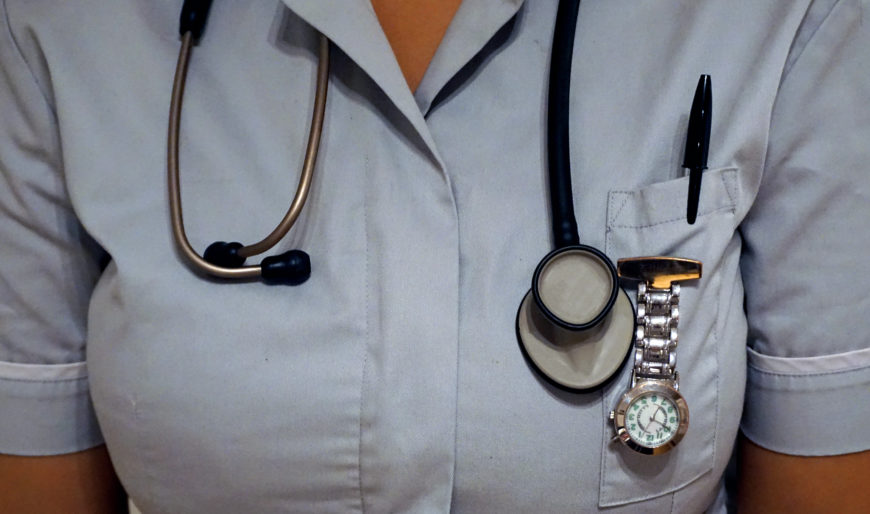Megan Wright
Megan Wright is a member of the National Assembly of Women and the Chartered Society of Physiotherapy.
As the public reels from the shock of a real-terms pay cut for nurses, an NHS worker reveals how life has been through the pandemic.

It is almost a year to the day of the first national lockdown, a year that has seen tremendous tragedy, and one that has exposed beyond any doubt the widening gap between the richest in our society and the poorest. It has been a year of phenomenal public support for essential workers, a group that I am proud to be part of.
The NHS is held as an exemplar of public healthcare services worldwide and an organisation I joined last year as a newly qualified physiotherapist. I was able to change careers and retrain in my mid-thirties due to an NHS bursary, for which my university fees and a small annual award was paid. Bursaries for nurses and allied health professions, such as physios, were scrapped in 2016. Thanks to a politically aware upbringing, public service is woven into my being and although not a condition of the bursary, I joined the NHS and East Sussex Healthcare Trust in August 2019. These first years of my practice have held unprecedented professional and personal challenges. Yet it has been a crucible for forging my beliefs about what is essential in our society.
On a daily basis, myself and my colleagues “gown up”, “glove up” and don our visors, decorated with our names and smiley faces, to try to communicate our kindness from behind our surgical masks. Throughout this pandemic, I have seen how hard my colleagues work as they care for the most vulnerable in our societies, the elderly, the young, the sick and dying and their families. We have adapted to all that has been asked, the constantly changing requirements of infection control measures and PPE, changes to shift patterns, changing roles, additional hours, additional responsibilities and more. We have survived this pandemic and its lockdowns with responsibilities outside of our working lives too, with families, children and our own loved ones to care for. These extraordinary humans have gone above and beyond their emotional, physical and mental capacity. The cost of this is unquantifiable.
Throughout this pandemic, I have seen how hard my colleagues work as they care for the most vulnerable in our societies, the elderly, the young, the sick and dying and their families.
Public support for the NHS has been overwhelming. Local companies and individuals donating and delivering care parcels of food, hand cream and biscuits have boosted morale. Notable national fundraising campaigns have raised millions for the NHS and the weekly “Clap for Heroes” initiative has made audible the public’s appreciation.
However, claps do not pay the bills! The NHS is not a charity. It should be a public service completely free at the point of care, funded through efficient and proportionate taxation. It should not be bolstered by charitable giving from those already poorest and most vulnerable in our society, whilst those with the largest incomes evade and avoid taxation by a government that encourages such behaviour. This pandemic has revealed how a well-funded, functioning healthcare system is a priority in our society. That begins with a decent wage.
Many NHS staff, and those who work for the private companies who profit from the systematic dismantling and asset-stripping of the NHS over successive governments, are not paid liveable wages. A staggering four in ten of NHS workers receive state benefits. The NHS was founded in the aftermath of WW2 when the UK economy was comparatively worse than it is today. The national debt exceeded that of when the Tory party launched ten years of austerity, a decade that saw public service workers experience pay freezes, which is a pay cut when inflation persists in increasing living costs. In 2018, the “Agenda for change” pay deal was negotiated for NHS staff, a three-year path out of wage stagnation. We edge closer to a new financial year and a new NHS pay review is being kicked down the road by this government.
This pandemic has revealed how a well-funded, functioning healthcare system is a priority in our society. That begins with a decent wage.
Evidence submitted to the NHS pay review body by the Chartered Society of Physiotherapy showed 80% of NHS physiotherapists asked carry out unpaid overtime on a regular basis. 58% of respondents also considered leaving the NHS in the last year, a sentiment I doubt is unique to physiotherapists. This is a measure of the UK government’s failure to financially recompense and recognise the value of the people who work in the NHS. Waiting for a national crisis, such as coronavirus, to recognise their worth is a travesty.
I will keep donning my uniform, PPE and graffitied visor and keep working in the NHS because I truly believe that it is a privilege to care for others. I urge you, in the strongest of terms, not to just clap on my behalf and all NHS workers. I urge you start shouting. And keep shouting until this government hears.
For more information: #WithNHSStaff campaign and www.theyworkforyou.com)
This article was originally published in Sisters magazine.
Megan Wright is a member of the National Assembly of Women and the Chartered Society of Physiotherapy.
Protecting free speech on Israel/Palestine